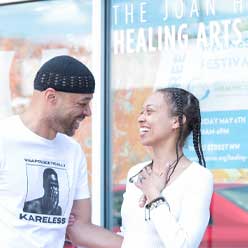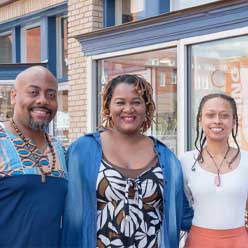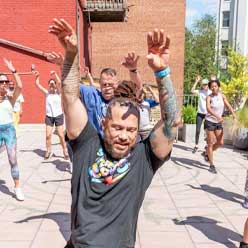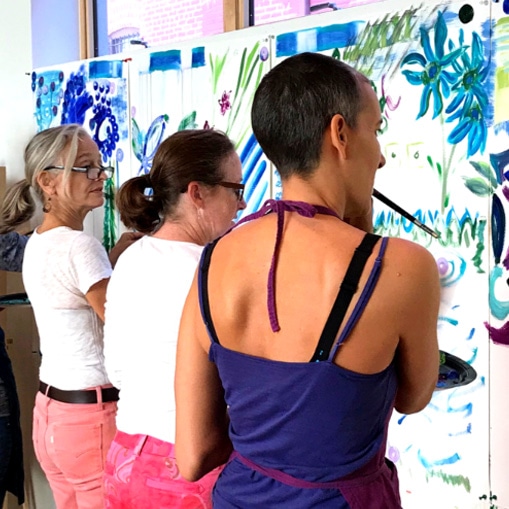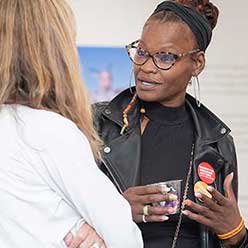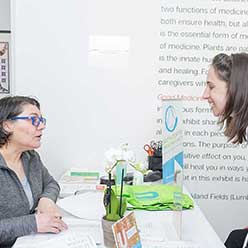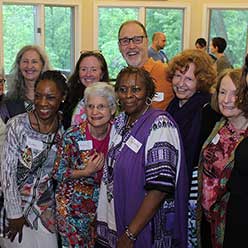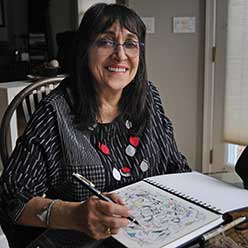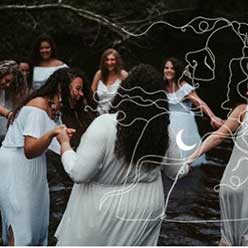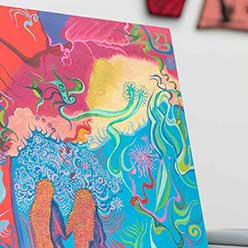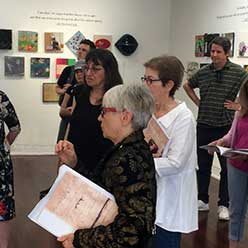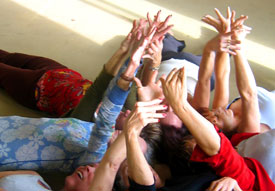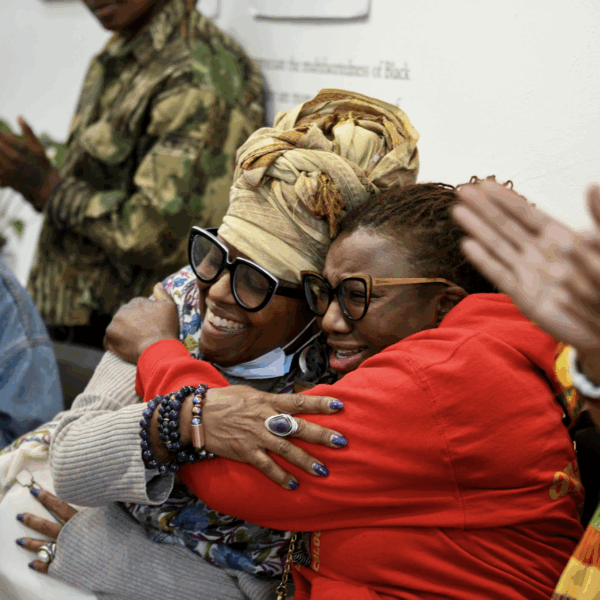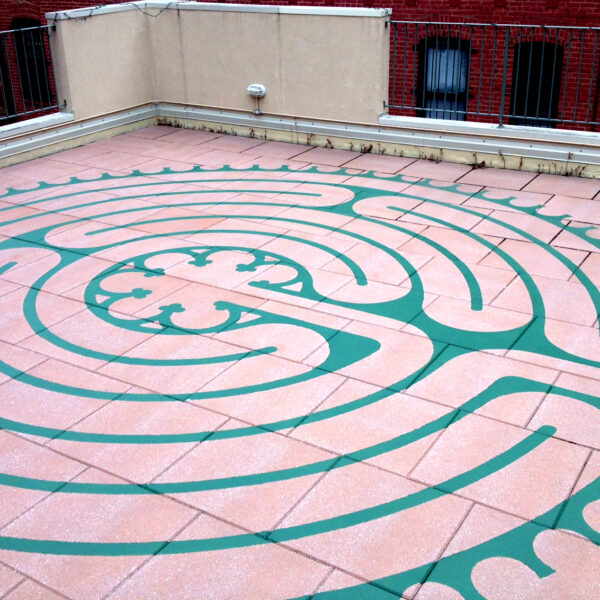Meet Chu Chu Sanders

Chu Chu Sanders, a patient navigator, sits with Integrative Navigation and Cancer Retreats Director, Carole O’Toole to talk about her introduction to and experience with Smith Center for Healing and the Arts.
Carole: How did you hear about Smith Center? What was your introduction?
Chu Chu: One of my girlfriends asked me if I would accompany her to Shanti’s going away party and when I got here I kinda looked around and was very intrigued by the environment because it was here in the art gallery. I started asking questions and as a matter of fact, she introduced me to you.
Carole: Yes, she did it was our fateful evening.
Chu Chu: Yes! And you told me you were a navigator. I went…what!? Right? And then after the event I sought you out and asked you about it and you explained more about it. I said I would like to learn more and we set up an appointment.
Carole: Although, I have a slightly different take. When we were at the event when we first met and you asked me what a navigator was – and of course it’s a crowded room and all – I think you knew then right away that you wanted to come back. Cause you said, “I’ll see you again.” You were pretty definitive. And you did, you came back and we talked more at one of the open sessions that I give here and I think I was intrigued by you as you were by the idea of navigation and so then we set up an official meet time to have a navigation session. So what do you feel you’ve gotten from navigation services? What has it done for you?
Chu Chu: Well the first thing that it did was I felt…why didn’t I have this in the first place? When I got my diagnosis I was initially referred to Georgetown and they told me I would have a navigator and that navigator was kind of a nurse navigator. She helped me get my appointment but that was the extent of it. It was not this thing about I’ll support you, I’m sorry that you had your diagnosis, let’s look together at what we can do together as it relates to what you might need as you go through this journey…none of that and it was interesting as also one of my processes I was asked to look at Cancer Treatment Centers of America. They talk like they have navigators and I had a navigator who helped me get my appointment but that was it. It has been an extremely overwhelming, nurturing, comforting experience, and I just believe as a result of that everybody should have a navigator.
Carole: What do you think stood out for you with how we approach navigation vs. your personal experiences with Georgetown and cancer treatment centers?
Chu Chu: Well one of the things I like was it was not cost prohibitive. You know, it was a free service and you explained what it was and I just said, “Well, wow. I need that.” It’s been that and more for me as you realize this now. It’s just been, it’s given me the strength that I need in order to basically deal with this diagnosis. It’s helped me in places where I couldn’t help myself. It’s not been all about that you’ve been there but you’ve made me see that I have the strength to do these things that I may not be able to see because I’m overwhelmed by the fact that I have this diagnosis.
Carole: I think for me I’ve enjoyed particularly our interactions because from day one we seemed to really work as a team and you come into me with ok, what’s my next assignment? And, off we go on whatever the topic is that’s of primary importance to you on that day. So I think that that’s really been a very nice experience on my side of the coin that’s not necessarily the way I connect with each individual because everybody’s different. But that’s been really unique from my stand point in navigation.
Chu Chu: And the other thing that’s really been amazing for me is the fact that you have this bag that you dip into and I just keep thinking, “Oh my god, what else is in there? What else can I ask her that’s in there that I didn’t could possibly be in there?” It’s like this big kinda, it goes all the way down. You pull something out and it’s just like, “Wow! What next?”
Carole: You’re making me think, I had a great aunt, that was a nun and I was always fascinated when I was a little kid because when I would go to my grandmother’s house it was my grandmother’s, actually her cousin that we called our aunt…and she would come in in her habit. And their pockets go all the way down to the floor and she would always dig down in to bring out a treat for us kids. So when you said that I’m thinking, “Yeah, I’m Sister Brenden!”
Chu Chu: Yeah, maybe that’s what you are.
Carole: So have you attended some of our other programs here? I know you come to yoga.
Chu Chu: Yeah, yeah I’ve done yoga, I’ve done one of the creative workshops. I’ve came to Jennifer’s and Julia’s you know, opening, their reception. I feel I’ve kinda moved around. I look on the calendar and I’ve been to a support group. And then I also had the opportunity, remember the students came and visited and I was a participant in that. So I’ve been around.

Carole: And of course the training now too.
Chu Chu: Yeah, that’s true.
Carole: So what made you decide with that turn I know it was you participated in that panel discussion then you came to me shortly after that. But what sparked you to go and spend a week, a considerable amount of time, learning this training on being a navigator?
Chu Chu: I think it was the when I was speaking with the students and understanding the fact that they could one day be in a position where they could actually, you know these are policy students, students who are learning about health policy, and their experience was coming here and going up on the hill. And me telling them that they could actually one day be in position where they could actually make a difference. I think for me I realized, wow, I’m in a position where I can make a difference. Navigation is something that I don’t believe everybody can do it but everybody may think they can do it. I do think it is an art. And I think I’ve been blessed with certain skills and I think, why not do that? You could help some people. You know, it became really obvious to me as I was telling them about myself. So, why not see if I can do if it’s not navigation as it relates to an individual maybe it’s helping the field move forward. I understand those nuances, those my strengths, you know I’m a problem solver so and a researcher. So why not bring that to the something that has helped me tremendously and I really, I’ve like fallen in love with it, so why don’t I help it? So that’s what happened with the students. I think it was an ‘ah ha!’ moment that kinda hit me as I was telling them. It was like for me as well.
Carole: And what skills do you think are needed in navigation? You said it’s an art.
Chu Chu: I think being an empathetic listener is really important. You know so it calls your listening skills and you know, your communications skills because you don’t want to say the wrong thing. So maybe less is probably better so you’re listening and you’re listening attentively. You know I’ve always said that, I mean I always knew as a kid that 80% of communication was listening, I always got that. Whereas other kids in class would struggle and I was like no, I’ve always been a good listener. Maybe that’s why I was a pediatrician. And it’s listening in a different way it’s not just listening to what somebody’s saying but it’s listening at how they’re being, what they’re emitting energy-wise, you know, those kind of things. So I think that’s one of the most important skills. I think a second important skill would be, being grounded yourself, so that the energy that you’re within doesn’t really pull you off or that if it does you know what to do to go back and restore your own energy. This is extremely important because its a communicative interaction as well. I think being a people person is extremely important. If you like people you’re going to be more successful at this then if you don’t like people. That’s not gonna work for you. Them either.
Carole: So if you want to put on your navigator hat for a minute, what advice would you give someone, how would you respond to somebody who’s just received a cancer diagnosis?
Chu Chu: Well first of all I would really, really, let them know that it does not mean they’re gonna die. Because many people think that, automatically. And let them know how many people are actually living with cancer right now. It’s a best kept secret I think. Then I would tell them that its really going to be important for them to understand when people tell you you need to listen to your body. This is the one time you’re going to have to become a master at that. Because it’s really important for you to feel your way through this as well. In spite of what everyone is telling you. You really have to feel your way. I think don’t be afraid that you might think about end of life issues because with the diagnosis it goes hand in hand so I’m not telling you once you get the diagnosis you should just think oh I’m gonna live. It’s a process and don’t be afraid of that and I’m gonna be here to help you through it.
Carole: So last question that Casey had on here, is, if you had to describe Smith Center in just a few words how would you describe it someone? They’re new in town and they’ve gotten a cancer diagnosis what would you say about Smith Center?
Chu Chu: Um, word, one word?
Carole: No, just a few.
Chu Chu: Yeah, I would say it’s warm, nurturing, loving and inspiring. It will instill hope in you.
